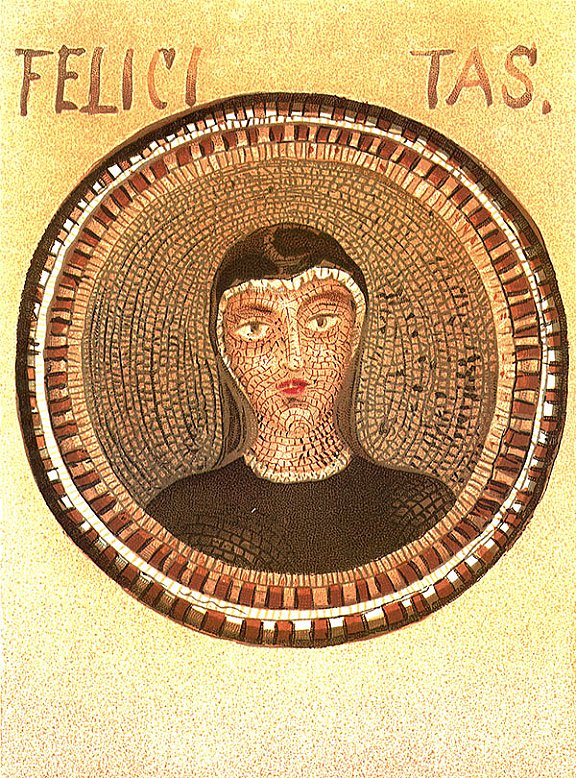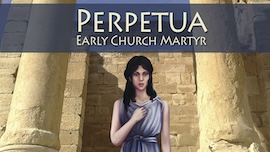Felicitas, a Slave, Triumphed over Satan in the Carthage Arena

North African mosaic depicts Felicias.
IN 202, Emperor Septimus Severus was cracking down on traitors to the Roman empire. Christians who refused to sacrifice to Roman gods were considered disloyal subjects who stubbornly refused to make a patriotic gesture. To the pagan mind, sacrificing was was no big deal, simply an act of homage to the state equivalent to saluting a flag in modern American culture. Christians, however, saw it as a denial of Christ. For them there could be no other Lord or God.
As a consequence of the imperial crackdown, five Christians were arrested in Carthage. These included Revocatus, Saturninus, Secundulus, and a slave girl named Felicitas. Also arrested was a young Roman woman named Perpetua. She was twenty-two years old and a new mother. Literate, she left an account of the Christians’ ordeal.
They were taken to a hot, dark dungeon where soldiers mistreated them. However, a pair of deacons, through bribery, managed to get them transferred to a more pleasant part of the dungeon for a while and obtained permission for Perpetua to nurse her son.
The procurator (Roman official) Hilarianus ordered the Christians to make the sacrifice to the pagan gods. Failure to do so would mean execution. When they refused, he sentenced them to face wild animals in the arena.
At the time, Felicitas was a catechumen, a Christian preparing for baptism. She was in her eighth month of pregnancy. Her fellow prisoners were afraid her condition would put her in the unenviable position of having to die alone for her faith at a later date, because Roman law did not permit execution of pregnant women. These friends wanted to stick together, even in death.
She was upset at the prospect of having to wait for martyrdom. Her prospects, however, changed when she went into early labor. As she groaned in the pain of delivery, some of the servants of the inner dungeon asked her how she would endure martyrdom if she could hardly bear the pain of childbirth. She answered, “Now it is I that suffers. Then there will be another in me, who will suffer for me, because I am also about to suffer for him.” Shortly afterward, she delivered a daughter, whom an unnamed Christian woman took to rear in her behalf.
Finally the test day came. The Christians were taken to the arena where a great crowd would watch them die. The pagans wanted to dress them in the garb of devotees of Saturn and Ceres, but the women pleaded to be allowed to go in their own clothes, saying they had endured everything for their own faith. They were finally granted their wish. Pagan though they were, the crowd shuddered when they saw that Perpetua was a delicate woman and noted that Felicitas’ breasts were heavy with milk.
Bound in nets, the women were exposed to a mad heifer that charged them and tossed them. When Perpetua saw that Felicitas had been crushed under the animal, she helped her to her feet. The crowd was soon sated with what they had seen and soldiers took the women back to the gate with the other Christians.
At the end, all the Christians kissed one another with the kiss of peace, and, silently and unflinchingly, faced the swords of guards who came to finish them off. Perpetua alone cried out, for the soldier assigned to her was young and struck her in a bone, causing her agony. She guided the sword to her throat. Joined together, Perpetua and Felicitas’ names mean in Latin “everlasting happiness,” which is what they trusted they would receive.
—Dan Graves
— — — — —
See the story of Perpetua at RedeemTV
Perpetua: Early Church Martyr can be purchased at Vision Video
Torchlighters has also done The Perpetua Story. You can purchase at Vision Video.








